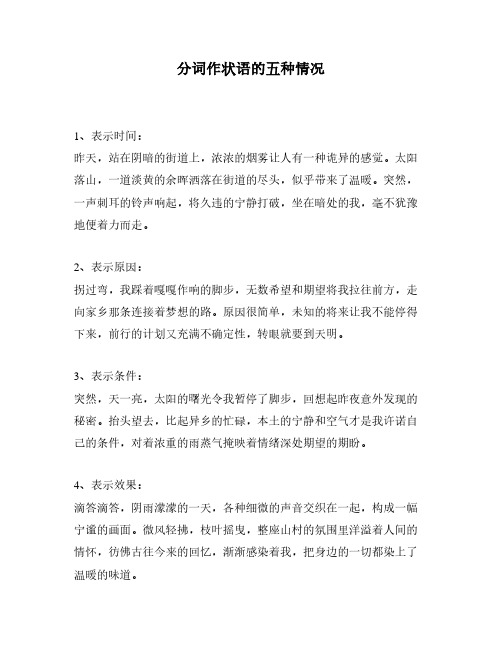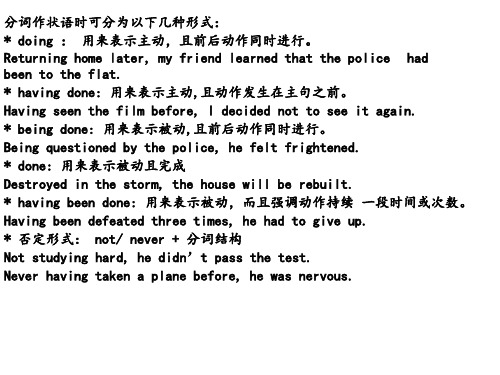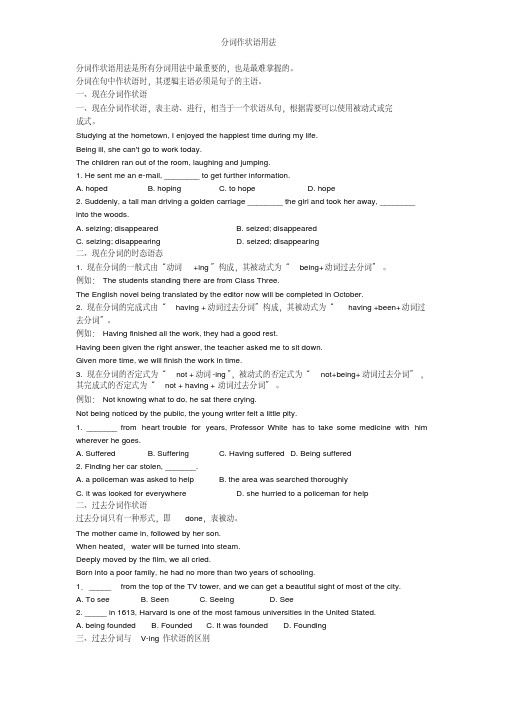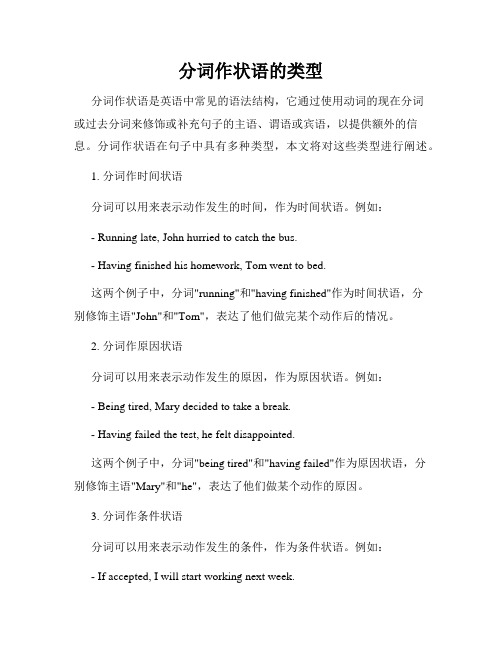分词做状语
分词作状语

extra pay.
working
3. Seen from the top of the hill, we find
the city more beautiful. Seeing
4. Generally speak, facial expressions are
helpful communications, too. speaking
Having done the work, he went home. 完成 了工作,他就回家了。
分词作状语
1.作时间状语 2.作原因状语 3. 作伴随状语
1)Having finished his homework, he went to play football.
2) Hearing the news, they got excited. 1)Not knowing his address, she went to a policeman for help.
(=Since you are a student, you should study hard.) 由于想到它或许在家,所以我就给他打了电话。 Thinking he might be at home, I called him.
(As I thought he might be at home, I called him.)
5)表条件 Using your head, you will find a way. (=If you use your head, you will find a way.) 一直往前走,你就会看到一座白色的房子。
W__a_l_k_i_n_g_a_h_e_a_d__, you will see a white house.
分词作状语的五种情况

分词作状语的五种情况
1、表示时间:
昨天,站在阴暗的街道上,浓浓的烟雾让人有一种诡异的感觉。
太阳落山,一道淡黄的余晖洒落在街道的尽头,似乎带来了温暖。
突然,一声刺耳的铃声响起,将久违的宁静打破,坐在暗处的我,毫不犹豫地便着力而走。
2、表示原因:
拐过弯,我踩着嘎嘎作响的脚步,无数希望和期望将我拉往前方,走向家乡那条连接着梦想的路。
原因很简单,未知的将来让我不能停得下来,前行的计划又充满不确定性,转眼就要到天明。
3、表示条件:
突然,天一亮,太阳的曙光令我暂停了脚步,回想起昨夜意外发现的秘密。
抬头望去,比起异乡的忙碌,本土的宁静和空气才是我许诺自己的条件,对着浓重的雨蒸气掩映着情绪深处期望的期盼。
4、表示效果:
滴答滴答,阴雨濛濛的一天,各种细微的声音交织在一起,构成一幅宁谧的画面。
微风轻拂,枝叶摇曳,整座山村的氛围里洋溢着人间的情怀,彷佛古往今来的回忆,渐渐感染着我,把身边的一切都染上了温暖的味道。
5、表示方式:
趁着丝丝晨雾未散的时刻,抽出一伙人携手暗中离去,终于享受到了米饭之间的松软,延续着昔日快乐的痕迹。
把一切都收拾妥当,仿佛穿越时空一样,令一个个熟悉的瞬间再次涌现心中,萦绕着幽暗曾经的眼前。
分词作状语

(1) ______ with so much trouble, we failed to complete the task on time. A. Faced B. Face C. Facing D. To face (2) ______ for the breakdown of the school computer network, Alice was in low spirits. A. Blaming B. Blamed C. To blame D. To be blamed
______ time, he’ll make a first-class tennis player. A. Having given B. To give C. Giving D. Given
四、用作让步状语 1. 例句 Living miles away, he attended the course. Defeated, he remained a popular boxer. Although he lived miles away, he attended the course. Thought he was defeated, he remained a popular boxer.
五、用作伴随状语 1. 例句 He sat in the chair reading a newspaper. Don't you sit there doing nothing. He came in, followed by his wife.
1) Don’t sit there ______ nothing. Come and help me with this table. A. do B. to do C. doing D. and doing (2) My cousin came to see me from the country, ______ me a full basket of fresh fruits. A. brought B. bringing C. to bring D. had brought (3) Whenever he was asked why he was late for class, he would answer carelessly, always _____ the same thing. A. saying B. said C. to say D. having said (4) We often provide our children with toys, footballs or basketballs, _______ that all children like these things. A. thinking B. think C. to think D. thought
英语分词作状语知识点总结

英语分词作状语知识点总结在学习英语的这条漫漫长路上,分词作状语这个知识点就像一个有点调皮的小精灵,时不时跳出来给咱使点绊子。
但别怕,今儿个咱就把它给拿捏得死死的!先来说说啥是分词作状语。
简单来讲,分词包括现在分词(doing)和过去分词(done),它们跑到句子里作状语,那作用可大了去了。
比如说,“Walking in the park, I saw a beautiful flower” 这里的“walking in the park”就是现在分词作状语,表示“我”在公园里走这个动作和后面“看到花”这个动作是同时发生的。
咱再细瞅瞅现在分词作状语的情况。
它可以表示时间、原因、条件、结果、伴随等等。
就拿时间来说吧,“Hearing the news, she jumped with joy” 听到消息的同时,她高兴得跳了起来,“hearing”就表明了两个动作几乎同时发生。
再比如原因,“Being ill, he didn't go to school” 因为生病,所以他没去上学,“being ill”就解释了为啥他没去学校。
过去分词作状语也有它的门道。
像“Seen from the top of the mountain, the city looks beautiful” 从山顶上看,城市很美。
这里“seen”就表示城市是被看的,有一种被动的意味。
我还记得当初学这个知识点的时候,那叫一个迷糊。
老师在讲台上讲得唾沫横飞,我在下面听得云里雾里。
有一次做作业,碰到一道题:“_____ by the teacher, the boy felt ashamed” 选项有 A Scolded BScolding C To scold D Having scolded 。
我瞅了半天,心里那个纠结啊,感觉每个选项都好像对又好像不对。
最后一咬牙,选了个 B,结果当然是错得一塌糊涂。
老师把我叫到办公室,耐心地给我讲解:“这道题是过去分词作状语,表示被动,被老师批评,所以应该选 A 呀。
分词作状语用法

Given more time, we could have done it better.
=If we had been given more time, we could have done it better.
______ time, he ’ ll make a-cfliarsts tennis player.
A. To see
B. Seen
C. Seeing
D. See
2. _____ in 1613, Harvard is one of the most famous universities in the United Stated.
A. being founded B. Founded C. It was founded 三、过去分词与 V-ing 作状语的区别
=As she was very weak, she couldn
’ t move.
(1) _____with so much trouble, we failed to complete the task on time.
A. Faced
B. Face C. Facing
D. To face
(2) ____for the breakdown of the school computer network, Alice was in low spirits.
2. ____ alone in the dark room, the little boy was so frightened as to cry.
A. Leaving
B. Left
C. To be left
D. Having left
3._____ by the beauty of nature, the girl from London decided to spend another two days on the
分词作状语的类型

分词作状语的类型分词作状语是英语中常见的语法结构,它通过使用动词的现在分词或过去分词来修饰或补充句子的主语、谓语或宾语,以提供额外的信息。
分词作状语在句子中具有多种类型,本文将对这些类型进行阐述。
1. 分词作时间状语分词可以用来表示动作发生的时间,作为时间状语。
例如:- Running late, John hurried to catch the bus.- Having finished his homework, Tom went to bed.这两个例子中,分词"running"和"having finished"作为时间状语,分别修饰主语"John"和"Tom",表达了他们做完某个动作后的情况。
2. 分词作原因状语分词可以用来表示动作发生的原因,作为原因状语。
例如:- Being tired, Mary decided to take a break.- Having failed the test, he felt disappointed.这两个例子中,分词"being tired"和"having failed"作为原因状语,分别修饰主语"Mary"和"he",表达了他们做某个动作的原因。
3. 分词作条件状语分词可以用来表示动作发生的条件,作为条件状语。
例如:- If accepted, I will start working next week.- Without any money, he couldn't buy the ticket.这两个例子中,分词"accepted"和"without any money"作为条件状语,分别修饰主语"I"和"he",表达了他们做某个动作所需要的条件或限制。
分词短语作状语讲解
分词短语作状语
【知识点解析】
四、用作让步状语 [典型例句] Living miles away, he attended the course. 虽然住在几英里以外,他仍去上课。 Defeated, he remained a popular boxer. 虽然被击败了,他仍是一个受欢迎的拳击手。 [理解技巧]分词(短语)用作让步状语通常可转换成由从属连 词though, although, no matter…等引导的让步状语从句,如: Although he lived miles away, he attended the course. Thought he was defeated, he remained a popular boxer.
_____ a record US$ 57.65 a barrel on April 4. (2005山东卷)
A. have reached B. reaching
C. to reach
D. to be reaching
【答案】B 【解析】此句也可换成:Oil prices have risen by 32 percent since the start of the year and reache【知识点解析】
[高考实例] (1) ______ with so much trouble, we failed to complete the task on time. (2006四川卷) A. Faced B. Face C. Facing D. To face
【答案】A 【解析】 faced with so much trouble可转换成原因状语从句because we were faced with so much trouble.
分词作状语(附练习)
分词作状语(附练习)中学英语教学资源网→教学文摘→分词作状语2011-11-21 →手机版分词作状语是高考考查的热点和重要考点,其热点考查内容如下:一.确定分词形式分词作状语时,通常放在句首,并且用逗号与主句隔开。
同时,分词作状语时其逻辑主语与主句主语应保持一致,也就是说在确定选择现在分词还是过去分词时,要判断主句主语与分词中心词的关系。
如果句子的主语是动词-ing形式所表示的动作的发出者(即表主动或正在进行),分词形式选用现在分词;如果句子的主语是动词-ed形式所表示的动作的承受者时(即表被动或完成),分词形式选用过去分词。
例:1, _______, I stretched my hand out for it.A. I saw the book I wanted on the shellB. The book I wanted was on the shellC. Seeing the book lying across the deskD. Lying on the desk分析:分词作状语时,其逻辑主语应与句子的主语一致。
根据这一原则,可知句子的主语I 只能与see保持一致。
如果选A, 该句中没有连词,没能构成并列句和主从复合句,此时要选用非谓语动词形式。
所以选C2, Seen from the hill, the park looks very beautiful.分析:“Seen from the hill”是过去分词作状语。
分词作状语时,其逻辑主语应与句子的主语一致。
根据这一原则,可知,“the park”是“Seen from the hill”的逻辑主语,它们之间表示被动关系,所以分词形式用seen.二.确立句子主语可能是谁确立句子主语可能是谁时,仍然遵循分词作状语时其逻辑主语与主句主语应保持一致的原则。
反过来要根据分词形式确立句子主语。
例:Having been attacked by terrorists, _________.A. doctors came to their rescueB. the tall building collapsedC. an emergency measure was takenD. warning were given to tourists分析: 本题仍考查非谓语动词的用法。
分词作状语
分词作状语在语法中,状语是一种修饰动词、形容词、副词或全句的词组或从句。
状语可以提供关于时间、地点、方式、原因、条件等方面的信息,以帮助读者更好地理解句子的意思。
在中文中,分词可以作为状语出现,以更准确地表达句子的含义和语气。
分词作时间状语分词作时间状语时,可以表示动作的时间、先后顺序、频率等。
常见的分词作时间状语的结构有“分词+时间状语”。
例句:1.昨天下雨,我带着雨伞走到学校。
2.听着音乐,我写完了这篇文章。
在上述例句中,分词作时间状语“听着音乐”和“带着雨伞”分别表示动作发生的时间和做某事的状态。
分词作地点状语分词作地点状语时,可以表示动作发生的地点或者动作的范围。
常见的分词作地点状语的结构有“分词+地点状语”。
例句:1.在花园里散步的时候,我发现了一只漂亮的蝴蝶。
2.躺在床上看书,我感到异常放松。
在上述例句中,分词作地点状语“在花园里散步的时候”和“躺在床上”分别表示动作发生的地点或者动作的范围。
分词作方式状语分词作方式状语时,可以表示动作的方式、方法等。
常见的分词作方式状语的结构有“分词+方式状语”。
例句:1.他用力地关上了门。
2.小明一边跳舞一边唱歌。
在上述例句中,分词作方式状语“用力地关上了门”和“一边跳舞一边唱歌”分别表示动作的方式。
分词作原因状语分词作原因状语时,可以表示动作的原因或动作发生的原因。
常见的分词作原因状语的结构有“分词+原因状语”。
例句:1.太阳下山了,天黑了。
2.因为下雨,所以他没有去散步。
在上述例句中,分词作原因状语“太阳下山了”和“因为下雨”分别表示动作发生的原因。
分词作条件状语分词作条件状语时,可以表示实现某种结果的条件。
常见的分词作条件状语的结构有“分词+条件状语”。
例句:1.如果你不努力学习,你就无法取得好成绩。
2.要是天气好,我们就去郊游。
在上述例句中,分词作条件状语“如果你不努力学习”和“要是天气好”分别表示实现某种结果的条件。
总结通过以上例句的分析,我们可以看出分词作状语能够丰富句子的表达,使得句子更加准确和生动。
分词作状语和独立主格结构
分词作状语和独立主格结构现在分词作状语:- Walking home, he saw a dog on the street.(现在分词作时间状语)- With the problem solved, she could relax.(现在分词作原因状语)- Smiling happily, the child thanked her teacher.(现在分词作方式状语)过去分词作状语:- Exhausted from the long journey, they went straight to bed.(过去分词作原因状语)- Surprised by the news, she dropped her phone.(过去分词作结果状语)- Broken down, the car couldn't start.(过去分词作条件状语)- Pleased with the results, she celebrated with her friends.(过去分词作方式状语)独立主格结构是由名词或代词与分词构成的结构,说明一个动作或状态跟随、伴随另一个动作或状态发生。
独立主格结构可以表示时间、原因、条件、方式等。
- His breakfast finished, Jack left the house.(时间独立主格结构)- The rain stopped, the players continued the game.(条件独立主格结构)- The cake eaten, the children happily played in the garden.(原因独立主格结构)- The teacher angry, the students were silent.(方式独立主格结构)需要注意的是,独立主格结构通常放在句子的开头或结尾,用逗号与主句分隔开来。
- 1、下载文档前请自行甄别文档内容的完整性,平台不提供额外的编辑、内容补充、找答案等附加服务。
- 2、"仅部分预览"的文档,不可在线预览部分如存在完整性等问题,可反馈申请退款(可完整预览的文档不适用该条件!)。
- 3、如文档侵犯您的权益,请联系客服反馈,我们会尽快为您处理(人工客服工作时间:9:00-18:30)。
分词作状语需要注意的问题:一. 表示伴随,行为方式He ran to me, holding a letter in his hand.Accompanied by his friends, he went to the railway station.He scratched his head, wondering how to solve the problem.She came back running.二.表示时间,相当于when, after 引导的时间状语从句Seeing this, we became worried. (When we saw this, we became worried.)Taking a key out of his pocket, he opened the door. (After he took a key out of his pocket, he opened the door.)Heated to 100 degree, water boils. (When water is heated to 100 degree, it boils.)三.表示原因,背景,状况,相当于because引导的状语从句Not having enough hands, we turned to them for help.Born in a poor family, he had only two years of schooling. Absorbed in his work, he neglected food and sleep.Not having received a reply, he decided to write again.Having finished the experiment, he left the lab.Having been giving such a good chance, hw could she let it slip away. 四.表示条件和假设,相当于if引导的状语从句Taken in time, the medicine will be quite effective.五.表示结果He fell down, striking his head against the ground and hurting it.六.独立主格形式(分词复合结构或独立结构)当上述的分词结构中主句的主语不是现在分词的动作发出者或过去分词的动作承受者时,分词有自己的主语Mother (being) ill, he didn’t go to school.With mother being ill, he didn’t go to school.Cf: Being ill, he didn’t go to school.Weather permitting, we shall go to the city park.Cf: Permitted, we shall go to the city park.The question (being) settled, we wound up the meeting.With the question being settled, we wound up the meeting.He came into the room, his face (being) red with cold.He came into the room, with his face being read with cold.七.已经成为固定用法的分词结构:Frankly speaking, I don’t like this dish.Judging from what you say, he has done a good job.Speaking of arts, do you like oil painting?Supposing (that) it rains tomorrow, will the sports meet be put off? General speaking, he is an honest man.Considering (that) you have finished your homework, you can watch TV now.Taking all things together, we have made quite a lot of money within the first month.Granting these differences, (姑且承认这些区别)Strictly speaking,Broadly speaking,Allowing for, (考虑到)Now try the following questions:1. Just as the value of telephone network increases with each new phone _____ to the system, so does the value of a computer system increase with each program that turns out.a. addingb. to have addedc. to addd. added2. There seemed little hope that the explore, ____ in the tropical forest, would find his way through it.a. to be desertedb. having desertedc. to have been desertedd. having been deserted3. All flights _____ because of the snowstorm, we decided to take the train.a. were canceledb. had been canceledc. having canceledd. having been canceled4. When _____ at the door, she was given a warm welcome.a. appearb. appearedc. appearingd. appears5. _____ from space, our earth, with water covering over 70% of its surface, appears as a “blue planet”a. Seeingb. Having seenc. To seed. Seen6. So many representatives _____, the conference had to be postpone.a. to be absentb. were absentc. being absentd. was absent7. No matter how frequently ______, the works of Beethoven always attract large audience.a. performingb. to be performedc. performedd. being performed8. The integrated circuit has reduced by many times the size of the computer, thus ____ a new generation of portable minicomputers. a. to create b. creatingc. createdd. creates9. When _____ about substances, the scientists find it convenient to classify them into solid, liquid, and gas.a. thoughtb. to thinkc. thinkingd. having thought10. It takes about an hour to get there, ______ possible traffic delays.a. it allowingb. its allowing forc. to allow tod. allowing for11. She had her arm ____ in an accident.a. to breakb. to be brokenc. brokend. breaking12. _____, she went back to her room.a. There is no cause for alarmb. Being no cause for alarmc. There being no cause for alarmd. Without having cause for alarm13. While reading the newspaper, _____.a. a colorful advertisement caught my eyesb.my attention was attracted by an advertisementc.I was attracted by a colorful advertisementd.What attracted my eyes was a colorful advertisement14. ______, he refused to give any explanationa.When asked to comment on the quality of the goodsb.When he being asked to commentc.When asking to comment on the quality of the goodsd.When he asked comment on the quality of the goods15. ____ a raining day, we gave up our plan to go for an outing.a. With itb. Beingc. Because it beingd. It being16. ____ in Beijing for many years, Mr. Park had little difficulty understanding Chinese.a. Having livedb. Livedc. Livingd. To live17. Little Mary ran back to the kitchen, eggs _____ carefully in her hands.a. were heldb. to be heldc. were being heldd. held18. The lecture ____, he left his seat so quietly that no one complained that his leaving disturbed the speaker.a. beganb. beginningc. having begund. had begun。
